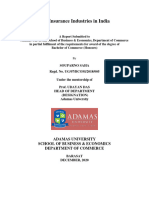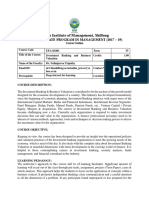0% found this document useful (0 votes)
35 views3 pagesAutomation
The document discusses the history and significance of automation, how it has transformed industries like manufacturing and agriculture, its impact on employment and income inequality, and its role in shaping the future through human-automation collaboration and ethical AI development.
Uploaded by
Tim Dela cruZCopyright
© © All Rights Reserved
We take content rights seriously. If you suspect this is your content, claim it here.
Available Formats
Download as DOCX, PDF, TXT or read online on Scribd
0% found this document useful (0 votes)
35 views3 pagesAutomation
The document discusses the history and significance of automation, how it has transformed industries like manufacturing and agriculture, its impact on employment and income inequality, and its role in shaping the future through human-automation collaboration and ethical AI development.
Uploaded by
Tim Dela cruZCopyright
© © All Rights Reserved
We take content rights seriously. If you suspect this is your content, claim it here.
Available Formats
Download as DOCX, PDF, TXT or read online on Scribd
/ 3























































































